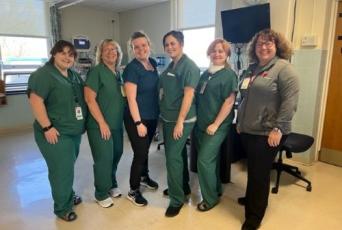
Inpatient Rehabilitation
Trust UHS to provide you with focused attention and therapy in a safe, monitored environment to help you ease back into your everyday life. If you require extra care and recovery after a hospital stay, inpatient rehabilitation gives you back the strength and stamina you need to thrive. Schedule your next appointment with our Binghamton-area inpatient rehabilitation team to get the individualized care you need to get back to your everyday life.
Integrated Healing & Recovery
Find highly sophisticated, integrated care at several UHS locations throughout the Southern Tier. Our interdisciplinary program helps you get back to the activities you love through a holistic approach that brings together your doctors, care providers and family members to work toward your recovery. This approach is one of the many reasons we discharge more patients to a home setting than the regional and national averages.
During Your Stay
You may work with a wide array of doctors, nurses and staff, including:
• Rehabilitation physician (physiatrist)
• Rehabilitation nurse
• Clinical social worker
• Physical, occupational and recreational therapists
• Speech-language pathologist
• Neuropsychologist
Focused Care for Acute Conditions
At UHS, get the extra assistance you need to recover from a hospital stay or learn new skills to cope with a physical disability caused by an injury or illness. The Sandiford Rehabilitation Center at UHS Binghamton General Hospital and Swing Bed Program at UHS Delaware Valley Hospital can give you the attention and care you need to get back to feeling like yourself again, including a team of providers like our world-class Binghamton-area neuropsychologists.
You may benefit from our inpatient rehabilitation programs offered in Binghamton and the surrounding cities if you experience:
• Stroke, brain injury or neurological condition
• Spinal cord condition
• Arthritis
• Orthopedic or joint condition
• Heart condition
• Amputation
• Pain condition
• Developmental or functional disability
• Lung condition
• Congenital condition
• Physical weakness due to an illness
For more information about acute-care inpatient therapy and rehabilitation around the Binghamton area contact the Sandiford Rehabilitation Center at 607-762-2652 or the Swing Bed Program at 607-865-2141.
Access to Inpatient Rehabilitation Services
You may participate in our inpatient physical therapy and rehabilitation services offered in Binghamton and throughout New York, starting at six years of age. Our programs are Medicare-certified and accepted by most insurance plans. This ensures you have access to the care you need when you need it.
| Learn more about our inpatient facilities | |
|---|---|
| Talk to a UHS staff member about the inpatient rehabilitation services near you. Binghamton: 607-762-2200 Johnson City: 607-763-6000 Norwich: 607-337-4111 Walton: 607-865-2100 |
|
UHS News
-
 The 2024 DAISY Team Award goes to the UHS Palliative Care teamMay 07, 2024
The 2024 DAISY Team Award goes to the UHS Palliative Care teamMay 07, 2024UHS has expanded the DAISY Awards beyond individual nurses to include an annual team award. The team recognition will be made every year during National Nurses Week. This year the DAISY Team Award goes to the Nurse Practitioners of the UHS Palliative Care team.
-
 UHS honors memory of Dr. Francis GilroyMay 07, 2024
UHS honors memory of Dr. Francis GilroyMay 07, 2024He was known and respected throughout the Greater Binghamton community as a distinguished ophthalmologist and as one of the founding leaders of the UHS healthcare system. Francis J. “Frank” Gilroy, MD, had a profound effect on healthcare in the Southern Tier region and on the culture of UHS in particular.
-
 UHS recognizes nurses, the lifeblood of careMay 06, 2024
UHS recognizes nurses, the lifeblood of careMay 06, 2024Healthcare in the U.S. has changed dramatically over the past 50 years and the profession of nursing has evolved with it, becoming more indispensable than ever in creating a great patient experience. Nursing today is often called the “lifeblood of healthcare organizations.”
-
 Valet parking returning to UHS hospitals in Binghamton, Johnson CityMay 03, 2024
Valet parking returning to UHS hospitals in Binghamton, Johnson CityMay 03, 2024Valet parking will resume this month at UHS Binghamton General Hospital and on the UHS Wilson Medical Center campus.

































